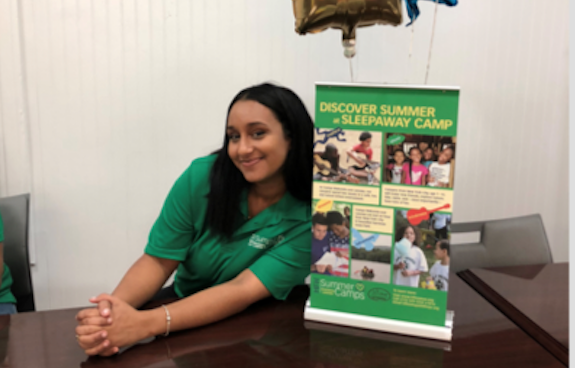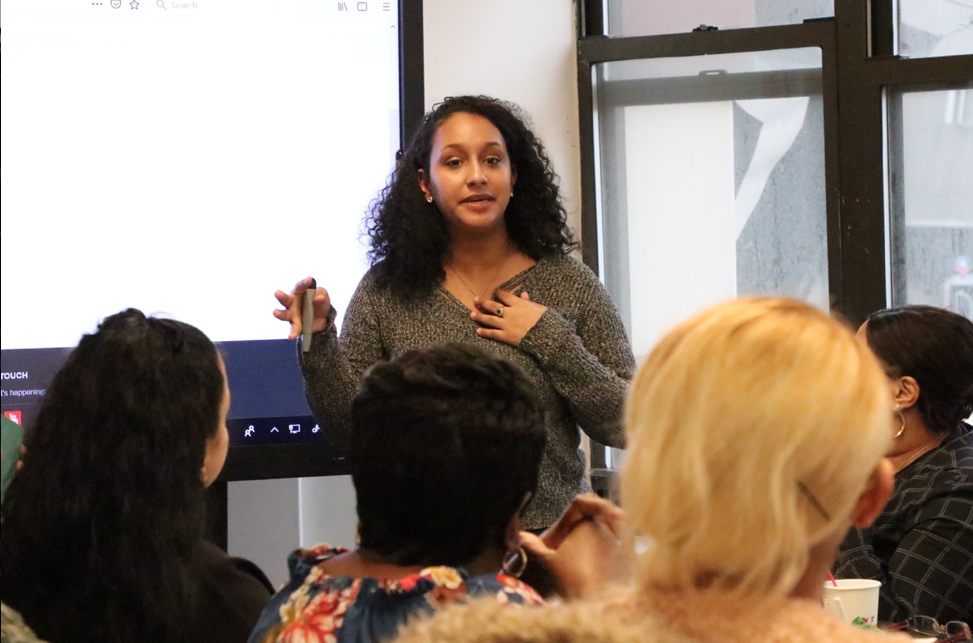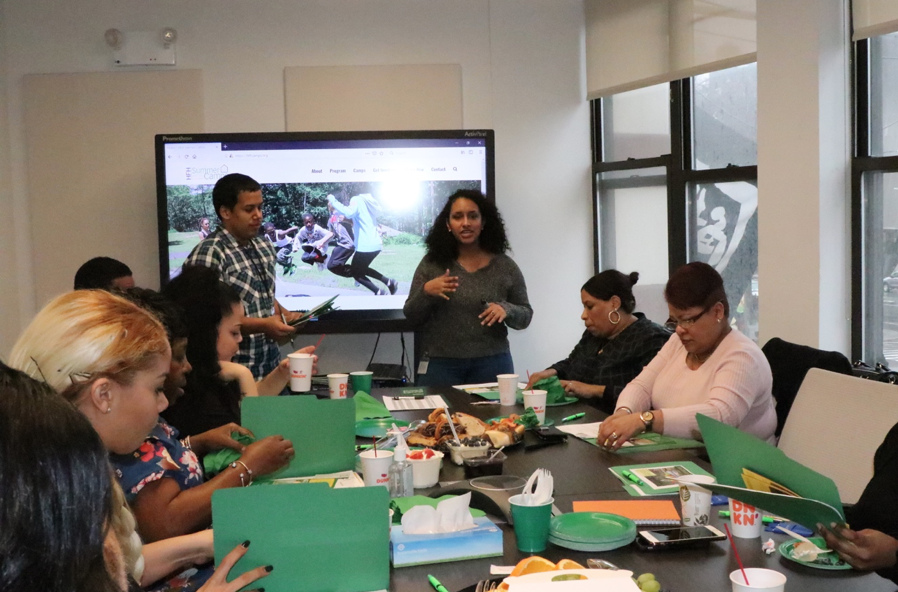The first session of HFH Summer Camps 2019 begins on June 28, but camper recruitment efforts are already underway for the summer, when hundreds of New York City kids will enjoy a free sleepaway camp experience.
Paola Rodriguez, Camp Registrar for HFH Summer Camps, is responsible for coordinating the team of Camp Recruiters that help families to navigate every aspect of camp attendance, from ensuring that families meet application deadlines to accompanying campers on their way to and from Camps Lanowa and Wakonda in Harriman State Park.
“We start in February because that’s when we have our Provider Breakfast,” says Rodriguez, referring to the annual HFH Camps Provider Breakfast, when shelter providers from throughout New York City gather to learn more about the 2019 application process. “And then, after that, we just start setting up information sessions, calling all the sites that we have on our database.”
Camp Recruiters travel to homeless shelters throughout New York City, where they present on the camps experience to families and staff. These information sessions are critical to spreading the word and building excitement about HFH Summer Camps.
Most children participating in HFH Summer Camps have never had a sleepaway camp experience before, and these information sessions are also a chance for Camp Recruiters to answer any questions and assuage parents’ concerns.
Rodriguez has worked in camper recruitment for four years, and over this time, she has learned to address parents’ common concerns while bringing attention to the unique features of an HFH Summer Camps experience. For example, the opportunity for kids to interact with international staff.
“One of the things that I love about our camps is the fact that they have diverse staff,” she says. “Whether it’s their accent or what they like to eat, they just bring a different aspect to the camp and it’s nice to see all the different people and the relationships they build.”
Part of Rodriguez’s appreciation for the staff’s diverse backgrounds stems from her own international experience as a teenager. At 17, she spent two weeks at an international school in Senegal through a school program. She credits the experience with sparking her interest in education and youth outreach.
“Something that I saw there was that there was a lot of poverty, and when I came back, my whole life kind of changed,” she says of the trip. “I felt more grateful for the things that I have and that I didn’t even think about prior to the trip. So, it was kind of an awakening experience.”
Shortly thereafter, Rodriguez applied for a Camp Counselor position with HFH Summer Camps. She was asked to consider a Camp Recruiter position instead due to her bilingualism and strong interpersonal skills.
“I had first applied as a Counselor because I didn’t get that experience as a child,” she says. “I interviewed over the phone and she told me that I would be perfect as a camp recruiter.”
Rodriguez was promoted to the role of Camp Registrar after three years working as a Camp Recruiter and one year working as a Senior Camp Recruiter. She also spent one year working as an Afterschool Teacher at Prospect Family Residence.
All children participating in HFH Summer Camps are experiencing or have previously experienced homelessness, which Rodriguez notes can add unique challenges to the application process. Camp Recruiters are responsible for ensuring that these complexities don’t interfere with a child’s participation in HFH Summer Camps.
“It takes them away from the complicated situation they’re in,” Rodriguez explains. “That experience takes a toll on the children and as adults, we might not notice that, but it really does. Their whole lives, they’ll always remember the time that they went to camp, seeing all the animals, swimming in the lake, and talking to their friends.”
Over the course of her four years working in camper recruitment, Rodriguez has also learned to address parents’ individual concerns with patience and a personalized touch.
“I try to make the parents feel as comfortable as possible and when I speak to them it’s like we’re having a conversation one on one,” she says. “As parents, they’re concerned about their children, so I try to talk to them as much as I can about safety and how we’re going to take care of their children.”
In addition to her role as Camp Registrar, Rodriguez was recently accepted into Hunter College, where she plans to pursue a bachelor’s degree in women’s and gender studies. She has already received her associate degree in education from Bronx Community College.
“In this organization, I was able to grow and learn things that I didn’t know throughout the four years that I’ve been working here,” Rodriguez says, noting that she began working for HFH Summer Camps while transitioning from high school into her first semester in college.
In the future, Rodriguez intends to continue working in education and youth outreach.
“I definitely want to be in a school environment, whether as a parent coordinator or a counselor. Somewhere where I can interact with kids daily,” she says. “If I get to help kids no matter what, that’s my big thing.”
In the context of HFH Summer Camps, Rodriguez notes that participation not only enriches kids’ summer vacation, but also acts as a springboard for connecting their families with the services and programs available to them. One of her most memorable moments as a Camp Recruiter came when she helped to facilitate a family’s access to health insurance, which is a prerequisite for participation in HFH Summer Camps.
“There was this one time where I had a kid who really wanted to attend camp, but he didn’t have insurance,” she recalls of the child, whose family had not yet applied for the health insurance program for which they qualified. “I connected them with the correct people and it got done. He was able to go to session three.”
Rodriguez’s experience with the child’s family exemplifies the personalized and proactive approach to problem-solving she has applied throughout her four years working in camp recruitment.
“What motivates me are their faces when I take them to camp and when I bring them back,” she says. “Fifteen years later they can say that they went to camp, and even if they don’t remember me, I feel like I played a part in that.”



